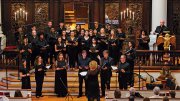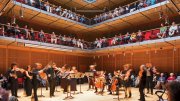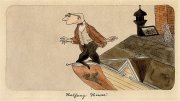When asked about the enduring appeal of The Boston Camerata and its repertoire of early music, artistic director Ann Azéma launches right in. There’s the underlying history and scholarship, and the fact that the ensemble’s concerts are still a relatively rare aesthetic experience among more mainstream musical events. “Wagner’s music is one thing,” she says. “It has a 150-piece orchestra with one singer…and there’s a beauty to that. But all these early styles are very chamber-sized. Even in a big church, there’s something very powerful to have a singer, an instrumentalist, or small group of instrumentalists just share music on a very human scale.”
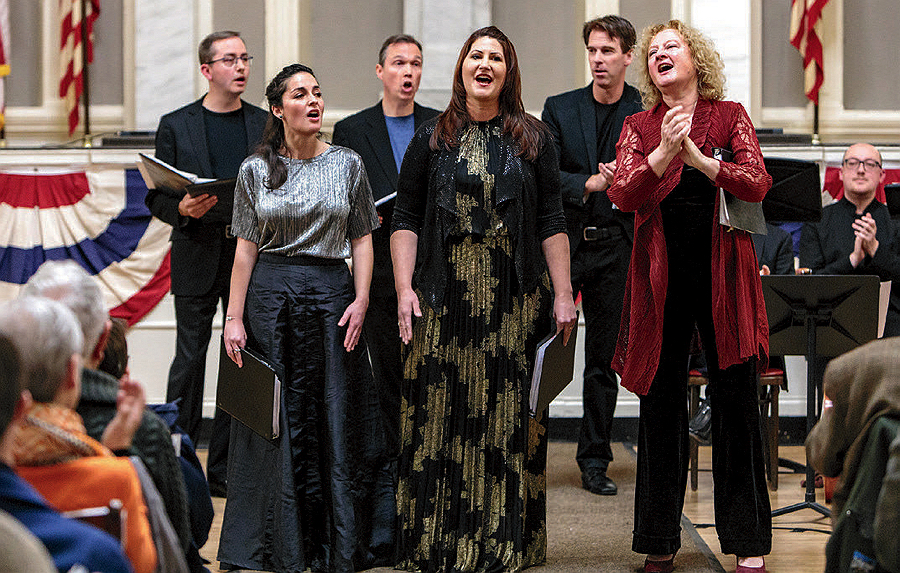
The group—celebrating its seventieth anniversary this season—performs European music of the medieval, Renaissance, and Baroque eras, along with early American music, like spirituals and Shaker hymns. Alongside its Greater Boston concerts, and more than 45 recordings, the ensemble regularly tours nationally and abroad. This December, look on the website for New England performances of “A Medieval Christmas” and “A German Christmas,” along with its special program “Les Miracles de Notre Dame,” commissioned to support the restoration of that cathedral following the 2019 fire.
Save for the addition of more American music, the ensemble’s mission has not changed dramatically since 1954. Its founder, Narcissa Williamson, then Museum of Fine Arts curator of early instruments, simply wanted the public to hear those kinds of instruments played. And that’s still the case. The Notre Dame piece, Azéma says, features a vielle (related to the modern violin), and this fall’s opening concert at the Museum of Fine Arts highlighted such Renaissance instruments as lutes, harps, flutes, early brass, and the viola de gamba. “Appreciation for the music comes and goes. After 70 years, some people still find it exotic,” says Joel Cohen, A.M. ’65, director of the group from 1968 to 2008, when Azéma, a medievalist and soprano (and his wife) took over. In 1963, when he first performed with the Camerata, he recalls “a few dozen people in the hall”; that audience grew to hundreds, and then thousands.
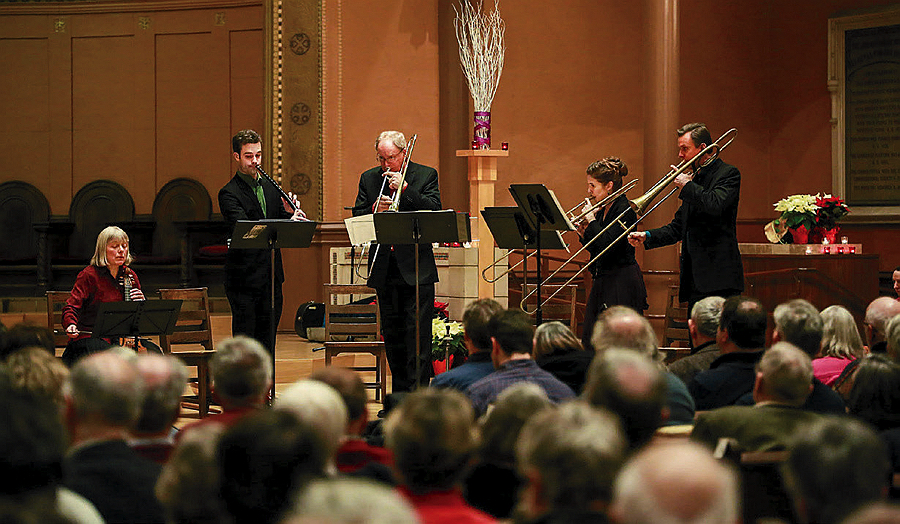
Cohen studied composition under composer and Rosen professor of music Randall Thompson, A.B. 1920 (see harvardmag.com/randall-thompson-01); he and Azéma have often met with scholars and delved into archival collections, including those at Harvard, to find and/or re-frame compositions. They have also often collaborated with Harvard ensembles in performances and recordings. Cohen’s love of American vernacular music expanded when Thompson introduced him to nineteenth-century “shape-note” hymnals printed to facilitate communal singing, and he eventually traveled to hear the music live in Alabama: “It sounded like the whole church was vibrating.” He and Azéma have also researched Shaker compositions at the Sabbathday Lake, Maine, community. That music, now a mainstay of the group’s repertoire, includes the 2004 dance-and-music theater work “Borrowed Light” by Cohen and Finnish choreographer Tero Saarinen (slated to be performed in Europe in 2025-26). More recently, the ensemble has developed programs around American spirituals, one of which, “Trav’ling Home: American Spirituals, 1770-1870,” will be performed at Boston’s Old West Church on April 27, 2025.
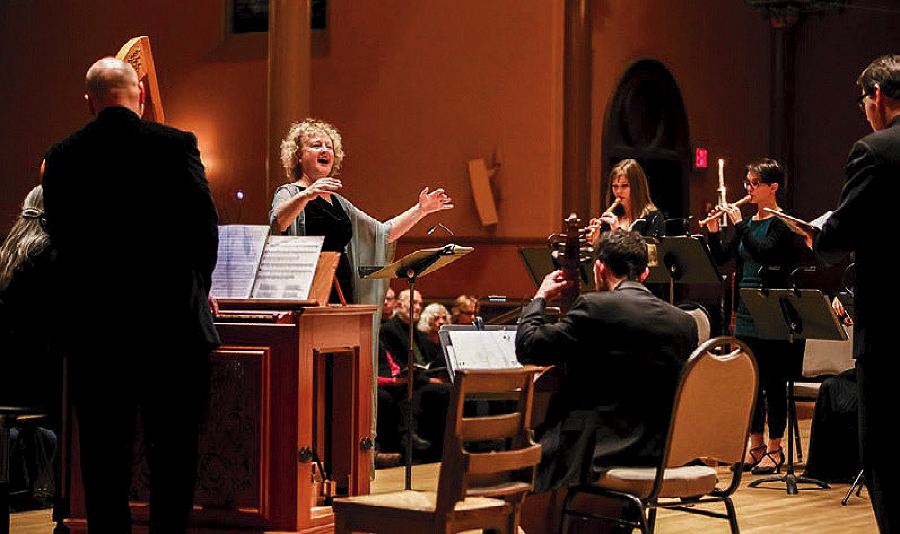
Among Boston Camerata’s best-known sources is the thirteenth-century liturgical Play of Daniel. Written by students at the school of Beauvais Cathedral in France, it’s based on the Biblical story of the captive prophet in Babylon. The work was revived in the 1950s by Noah Greenberg, founder of New York Pro Musica, and first performed by the Camerata in 1985, under Cohen. The newest edition and staging, by Azéma, is to be performed in January at Trinity Church in Boston; it emphasizes Daniel’s faith in standing against the king and the play’s powerful contemporary message. “He did tell Belshazzar that he was a bad leader and he was going to fall—and he fell. And if you are a bad leader, you are going to fall,” she says. The play still resonates because it “has everything to do with how we think, and how we relate to power, and how we can relate the truth to power.”
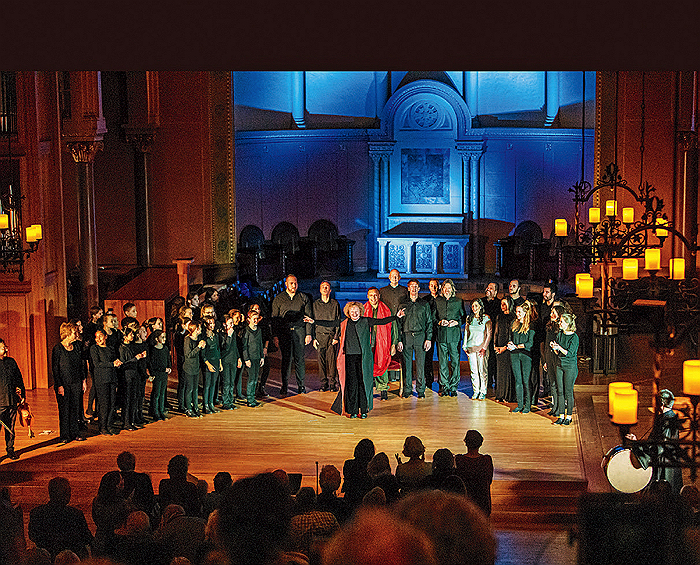
The point of a Boston Camerata concert, she continues, is “to be able to wear your knowledge lightly, and create another place for all human beings to discover and enjoy music and the narrative of the music. There is a constancy in the human soul that makes it important to know and enjoy the past as we become ourselves and look at the future.”
Music conveys the flow of history, Cohen says. Boston Camerata concerts show “that something old can still make you vibrate, that something comes alive across the centuries.”
